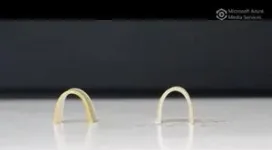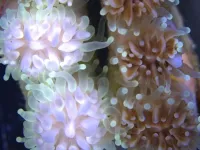(Press-News.org) University of Arizona Health Sciences researchers received a $13.1 million grant from the National Institute on Aging to continue studies aimed at rejuvenating the immune system of older people in order to improve health throughout the lifespan.
Older adults are disproportionally affected by infection, cancer and certain types of autoimmune disease. This is influenced by the fact that as a person ages, their body produces fewer T cells and gets less proficient at maintaining them. T cells are a type of white blood cell essential to the immune system and defense against infection.
“It is clear how much our immune system declines with age when you look at all the previous epidemics and pandemics that have hit us, including COVID-19. Older adults die at a rate somewhere between 50 to 300 times more frequently than people in the younger age groups,” said principal investigator Janko Nikolich, MD, PhD, professor and head of the Department of Immunobiology at the University of Arizona College of Medicine – Tucson. “We are looking at the thymus gland, which develops T cells, and at the lymph nodes, which maintain them, and examining how we can combat the erosion of age by jumpstarting them.”
The goal of the National Institutes of Health-funded research is to contribute to the fundamental knowledge of T cell aging and create interventions to improve immune defense. The program consists of three research studies and four supporting cores that span multiple sites across the country.
“This program is a great example of integrated and coordinated team science. We exchange our ideas and findings and troubleshoot each other’s experiments,” said Nikolich, who leads two UArizona Health Sciences strategic initiatives: Personalized Defense and the Aegis Consortium. “Everyone is working on their separate projects, but each project benefits from what we all discover.”
The first project, “Response of aged thymus to injury and rejuvenation signals,” is led by Jarrod Dudakov, PhD, associate professor at Fred Hutchinson Cancer Research Center and affiliate associate professor at the University of Washington. The research team hopes to increase their understanding of how the thymus responds to injury and repairs itself.
The thymus gland has a remarkable capacity for bouncing back from acute injury caused by infection, shock or chemotherapy, but this ability deteriorates with age. The project will focus on enhancing thymic regeneration in older individuals, which could result in clinical approaches to enhance the immune system.
The second project, “Role of the microenvironment in regulating early stages of thymic involution and central tolerance,” is led by Lauren Ehrlich, PhD, professor of molecular biosciences and oncology at the University of Texas at Austin. It will examine how the cellular composition of the thymus changes with age, which could impact the quantity and quality of developing T cells.
The third project, “Peripheral T cell maintenance defects with aging,” focuses on how aging affects the lymph nodes. It is part of Nikolich’s continuing studies of how the decline in naive T cells impacts the immune system. Naive T cells are produced in the thymus but need additional support from the lymph nodes to function effectively.
“Our previous research has shown that defects in the lymph nodes can powerfully undermine the benefits of reawakening T cell production in the thymus,” said Nikolich, who is a member of the university’s BIO5 Institute. “So, even if we can generate a plethora of high-quality T cells, if the lymph nodes are impaired, those T cells will be clueless. They will not be able to quickly react and respond to infection.”
The first signs of age-related vulnerability to infection start between the ages of 40 and 50. More drastic declines in the immune systems are seen in the 60s, 70s and 80s. Nikolich says interventions to improve T cells and the immune system could greatly benefit the quality of life for older people and provide substantial economic relief for health care expenses.
This work is supported by the National Institute on Aging, a division of the National Institutes of Health, under award no. 2P01AG052359-06. It is part of a collaborative research effort that also includes investigators from the Fred Hutchinson Cancer Research Center, the Memorial Sloan Kettering Cancer Center, University of Texas at Austin, MD Anderson Cancer Center and Arizona State University.
END
$13M NIH grant funds research aimed at revitalizing immune systems of older adults
A $13 million NIH grant will fund three projects designed to help researchers learn more about how T cells are created and maintained and create interventions to improve immune defense.
2023-11-02
ELSE PRESS RELEASES FROM THIS DATE:
Study provides preliminary evidence in favor of a new type 1 diabetes treatment
2023-11-02
Type 1 diabetes is an autoimmune disease that causes the body's immune system to attack and destroy insulin-producing beta cells in the pancreas. Traditional management of type 1 diabetes has primarily involved replacing the missing insulin with injections which, though effective, can be expensive and burdensome. A new study led by researchers at the University of Chicago Medicine and Indiana University suggests that an existing drug could be repurposed to treat type 1 diabetes, potentially reducing dependence on insulin as the sole treatment.
The research centers on a medication known as α-difluoromethylornithine (DFMO), which inhibits an enzyme that plays a key role in cellular ...
New branch of oncology, cancer neuroscience, offers hope for hard-to-treat brain tumors
2023-11-02
Cancer cells hijack normal biological processes, allowing them to multiply. For example, tumors spur construction of new blood vessels, building themselves “highways” to supply nutrients.
Researchers have known about cancer’s blood vessel infiltration for decades, but it was only in the past few years that Stanford Medicine scientists and their colleagues discovered that tumors don’t just tap the body’s highway system; they can also infiltrate and exploit its “telecommunications.”
To ...
Less physical activity in adolescence likely rooted in biology
2023-11-02
AURORA, Colo. (Nov. 1, 2023) – The slowdown of physical activity during adolescence is not likely caused by lifestyle and environment but by energy demands placed on the body as it grows and sexually matures, according to a new study by researchers at the University of Colorado Anschutz Medical Campus.
The study, published today in the Proceedings of the Royal Society B, examined the lifestyles of the physically active Tsimane people, an indigenous population of forager-horticulturalists in lowland Bolivia, to see similarities and differences to adolescents living in post-industrialized nations.
“We wanted to look at the role of environment and the role of biology,” ...
Adult coral can handle more heat and keep growing thanks to heat-evolved symbionts
2023-11-02
Adult fragments of a coral species can better tolerate bleaching and recover faster when treated with tougher heat-evolved symbionts, new research from the Australian Institute of Marine Science (AIMS) and the University of Melbourne indicates.
The study also found that treatment with the heat-evolved symbionts did not compromise the coral’s ability to grow. This differs from previous studies on Great Barrier Reef corals which found that naturally heat tolerant symbionts could enhance heat resistance in adult corals, but at a cost to its growth.
Symbionts are the tiny cells of algae that live inside the coral tissue, providing corals with energy to grow. The survival ...
Stronger, stretchier, self-healing plastic
2023-11-02
An innovative plastic, stronger and stretchier than the current standard type and which can be healed with heat, remembers its shape and partially biodegradable, has been developed by researchers at the University of Tokyo. They created it by adding the molecule polyrotaxane to an epoxy resin vitrimer, a type of plastic. Named VPR, the material can hold its form and has strong internal chemical bonds at low temperatures. However, at temperatures above 150 degrees Celsius, those bonds recombine and the material can be reformed into different shapes. Applying heat and a solvent breaks VPR down into its raw components. Submerging it in seawater ...
Brain health in over 50s deteriorated more rapidly during the pandemic
2023-11-02
rain health in over 50s deteriorated more rapidly during the pandemic, even if they didn’t have COVID-19, according to major new research linking the pandemic to sustained cognitive decline.
Researchers looked at results from computerised brain function tests from more than 3,000 participants of the online PROTECT study, who were aged between 50 and 90 and based in the UK. The remote study, led by teams at the University of Exeter and the Institute of Psychiatry, Psychology & Neuroscience (IoPPN) at King’s ...
Low Emission Zones improve air quality, health, and people’s well-being – new policy brief
2023-11-02
The introduction of London's Low Emission Zone (LEZ) in 2008 and subsequent Ultra-Low Emission Zone (ULEZ) from 2019 has significantly improved air quality, benefiting Londoners’ physical and mental health, according to new analysis from the Department of Economics at the University of Bath.
A new Institute for Policy Research (IPR) policy brief, presenting research from health economists at the University, indicates that the introduction of the LEZ helped to reduce particulate matter (PM10) in Greater London by 13% between 2008-13, compared to pre-LEZ levels (2003-07).
The ULEZ has had an even more substantial impact, ...
An MRI-equipped ambulance: A game-changer for stroke care?
2023-11-02
In the U.S., someone has a stroke every 40 seconds and dies from it every three minutes and 14 seconds, according to the Centers for Disease Control and Prevention. When it comes to stroke, experts echo the fact that time is brain. Faster treatment translates to better outcomes, and certain treatments, like the clot-busting drug tPA, have a strict time window for administration.
“The quicker that we can get the patient to treatment, the quicker we can have a good outcome,” said Dustin LeBlanc, M.D., director of Prehospital Medicine and associate chief medical officer for Emergency Management at the Medical University of South Carolina (MUSC). ...
Repurposed drug offers new potential for managing type 1 diabetes
2023-11-01
INDIANAPOLIS -- A recent study led by Indiana University School of Medicine in collaboration with the University of Chicago Medicine presents exciting future possibilities for the management of type 1 diabetes and the potential reduction of insulin dependency. The researchers’ findings, published in Cell Reports Medicine, suggest repurposing of the drug α-difluoromethylornithine (DFMO) may open doors to innovative therapies in the future.
Type 1 diabetes is a chronic condition wherein the body's immune system mistakenly ...
UCF hires Director of Development and Operations for Virtual Experience Research Accelerator (VERA)
2023-11-01
UCF Hires Director of Development and Operations for Virtual Experience Research Accelerator (VERA)
ORLANDO, Nov. 1, 2023 – Ali Haskins Lisle, Ph.D., has been named the Director of Development and Operations for the UCF-led Virtual Experience Research Accelerator (VERA).
VERA is a nearly $5 million U.S. National Science Foundation project to develop the first large-scale human-machine system for virtual reality human subjects research, with the goals of affording very large studies, very quickly, with populations that ...
LAST 30 PRESS RELEASES:
Blood test predicts which bladder cancer patients may safely skip surgery
Kennesaw State's Vijay Anand honored as National Academy of Inventors Senior Member
Recovery from whaling reveals the role of age in Humpback reproduction
Can the canny tick help prevent disease like MS and cancer?
Newcomer children show lower rates of emergency department use for non‑urgent conditions, study finds
Cognitive and neuropsychiatric function in former American football players
From trash to climate tech: rubber gloves find new life as carbon capturers materials
A step towards needed treatments for hantaviruses in new molecular map
Boys are more motivated, while girls are more compassionate?
Study identifies opposing roles for IL6 and IL6R in long-term mortality
AI accurately spots medical disorder from privacy-conscious hand images
Transient Pauli blocking for broadband ultrafast optical switching
Political polarization can spur CO2 emissions, stymie climate action
Researchers develop new strategy for improving inverted perovskite solar cells
Yes! The role of YAP and CTGF as potential therapeutic targets for preventing severe liver disease
Pancreatic cancer may begin hiding from the immune system earlier than we thought
Robotic wing inspired by nature delivers leap in underwater stability
A clinical reveals that aniridia causes a progressive loss of corneal sensitivity
Fossil amber reveals the secret lives of Cretaceous ants
Predicting extreme rainfall through novel spatial modeling
The Lancet: First-ever in-utero stem cell therapy for fetal spina bifida repair is safe, study finds
Nanoplastics can interact with Salmonella to affect food safety, study shows
Eric Moore, M.D., elected to Mayo Clinic Board of Trustees
NYU named “research powerhouse” in new analysis
New polymer materials may offer breakthrough solution for hard-to-remove PFAS in water
Biochar can either curb or boost greenhouse gas emissions depending on soil conditions, new study finds
Nanobiochar emerges as a next generation solution for cleaner water, healthier soils, and resilient ecosystems
Study finds more parents saying ‘No’ to vitamin K, putting babies’ brains at risk
Scientists develop new gut health measure that tracks disease
Rice gene discovery could cut fertiliser use while protecting yields
[Press-News.org] $13M NIH grant funds research aimed at revitalizing immune systems of older adultsA $13 million NIH grant will fund three projects designed to help researchers learn more about how T cells are created and maintained and create interventions to improve immune defense.





